Nuns

Historically, there have been many Catholics who have pushed back against gender norms. But like modern conservatives who focus on the outrageous aspects of the Sisters of Perpetual Indulgence while ignoring the group’s tireless work caring for the sick, homeless, and poor, the Catholic hierarchy has also attempted to mute the stories of gender-nonconforming people throughout its history. And in doing so, the church hierarchy has often ignored the acts of mercy so central to Catholic teaching.

Nearly 30 groups of Catholic nuns, totaling more than 6,000 people across 18 states, signed onto a statement celebrating Trans Day of Visibility and calling people to resist anti-transgender legislation in their states.
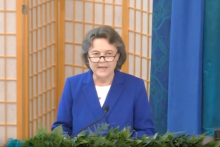
Every year the Leadership Conference for Women Religious, an association made up of leaders of institutes for Catholic sisters in the United States, hosts an international assembly. This year, it opened with an apology.
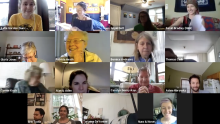
Behind the scenes, in prayer, organizing, poll-working, and demonstrating, Catholic sisters are participating in a milieu of ways that haven’t gone viral.
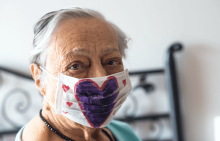
Founded in 1872 by the Sisters of St. Joseph (CSJs) as a home for ill and retired members, Nazareth found itself among many care facilities making the difficult decision to confine residents to their rooms as the coronavirus tore through the nation in early March. Even with their efforts, the Nazareth community has lost seven Sisters and 30 residents in total to COVID-19.

He pointed out that this is not a new problem, confirming that the Catholic Church knew about the abuses against nuns even if the public did not.
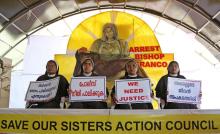
Sister Anupama, who led the protests in Kochi, said that the survivor approached the superior general in early 2017 with concerns about harassment — she was facing disciplinary action because of her resistance to “lie down with” the Bishop. Her concerns were ignored. In June 2017, before reaching out to church officials in northern India and the Vatican, she first revealed to a parish priest and bishop in Kerala that she had been abused by Mulakkal. The complaint then reached the Cardinal Mar George Alencherry, the head of the Syro-Malabar church, but no action was taken.
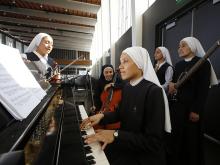
The band’s songs of love and faith have earned over a million YouTube views and led to the release of two CDs, and now the nuns are waiting to see if they are among the honorees when Latin Grammy nominations are announced Sept. 20.
Siervas recently traveled to Southern California and drew 4,000 people when the band headlined a Spanish-language Catholic music festival.

Based near the town of Merced in the Central Valley, which produces over half of the fruit, vegetables, and nuts grown in the United States, the Sisters of the Valley grow and harvest their own cannabis plants.

A new film opening July 8 focuses attention on a long-ignored war crime — the sanctioned and systematic rape of Polish nuns during World War II.
The Innocents (Les Innocentes) tells the story of a young French doctor who is called to a Polish convent to aid a young novice in a breech labor. She discovers that Soviet soldiers, with the approval of their officers, raped dozens of the nuns during the occupation, leaving five of them pregnant.
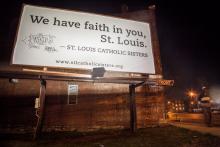
This Mississippi River city and the surrounding area have taken some hits over the past year, from the ongoing racial tensions over police shootings in Ferguson to the deadly and costly floods that struck the region earlier this year. Even St. Louis’ pro football team has bailed, as the Rams announced in January that they are decamping to the sunnier climes of Southern California.

Four nuns from the order founded by Mother Teresa of Calcutta are reportedly among 16 killed by gunmen who attacked a church-run retirement home in Yemen, the latest attack on Christians in the increasingly lawless country.
The women religious, members of the Missionaries of Charity congregation, were killed when four armed men attacked the convent and home for the elderly in the southern city of Aden on March 4, the Catholic news agency Fides reported.

And then Wednesday night, at the end of a marathon day in the nation’s capital, after canonizing St. Junipero Serra at the National Basilica, the pope made an unscheduled, last-minute stop to visit with the Little Sisters of the Poor, a Catholic religious order dedicated to caring for the elderly. (The sisters gained notoriety for their lawsuit against the federal government over Obamacare’s contraception mandate, but reportedly the pope made no mention of it when he stopped by the Washington convent.)
“It’s his actions that give credibility to what he says,” Sister Mary Richard, a nun from Queens Village, N.Y., who met “Papa Francesco” during the surprise visit, told me Thursday morning as we both waited at Union Station to board an Amtrak train bound for New York City.
She continued,
“He was exhausted but he came. He took the time to come. We take care of the elderly and he said, ‘Thank you. People just throw them away or get rid of them.’
“When he arrived the Mother Superior went out to greet him and she said, ‘Holy Father you must be so tired.’ And he said, ‘Priests and bishops get tired, but you don’t count the cost. But nuns, they never complain.’ “It’s his attitude, ya know?”
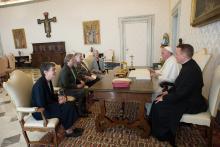
The controversial Vatican probe of American nuns that abruptly ended last month looked from the outside like a tense standoff between Rome and the U.S. sisters, punctuated by occasional public jousts that appeared to signal even tougher negotiations behind closed doors.
Not so, say the sisters, now freed to talk after both sides agreed to a month-long media blackout that ended May 15.
Those involved in the talks said that after a rocky start, the talks settled into a constructive dialogue that cleared up many misunderstandings that Vatican officials had about the sisters.

IT’S THE 50TH anniversary of The Sound of Music. I never thought I’d write about it here, but someone recently offered me the kind of gentle admonishment that Maria might have given to the von Trapp children. Maria is usually right, and my friend is too. One of the wisest film critics I know, a man dedicated to contemplation and activism and who doesn’t shy away from the more challenging edges of cinema, still considers it his favorite film.

Sister Mary Ann Walsh, a quiet nun with a keen wit who led a very public life as a journalist and a longtime spokeswoman for the U.S. Conference of Catholic Bishops, died on April 28 after a tough battle with cancer.
She was 67 and passed away in a hospice in Albany next to the regional convent of the religious order she entered as a 17-year-old novice in 1964.
Walsh had moved to her native Albany from Washington last September after it was discovered that the cancer that had been in remission since 2010 had returned.
She was able to receive better care there and live out her days with other members of the Sisters of Mercy. She was transferred to the hospice on April 23 as her condition deteriorated.
“Sister Mary Ann,” as she was known to the many journalists she sparred and joked with and, with regularity, befriended, worked at the communications office of the American hierarchy for 20 years, retiring in the summer of 2014 just before she fell ill again.
She became director of media relations for the USCCB — the first woman to hold that position — after coordinating media for World Youth Day in Denver in 1993, which featured an enormously successful visit by then-Pope John Paul II.

While some people may have heard of the great work of Nuns on the Bus to engage people on pressing social issues, there’s also the “Nuns on the Underground Railroad”—a quiet movement of nuns working together to restore dignity and healing for victims of labor and sex trafficking across the nation and the world...
For several years now, Catholic nuns have been proactive in preventing sex trafficking before, during, and after major sporting events like the Super Bowl by raising public awareness and conducting personal visits to hotels to alert them to the signs of human trafficking. Nuns have also placed full-page ads in airline magazines to educate the public about the dangers of child trafficking.
A fundamental theological and scriptural principle for Christians is that each human person is made in the image and likeness of God. This belief in the imago Dei helps us to see the face of God even when the person doubts her own beauty and worth because of oppression. “Nuns on the Underground Railroad” seeks to restore a person’s sense of dignity and beauty through two rails of freedom: healing through programs and shelters and empowerment through education and employment.
As we move toward the Lenten season, the prophet Isaiah reminds us: "Is not this the fast that I choose: to loose the bonds of injustice, to undo the thongs of the yoke, to let the oppressed go free, and to break every yoke?" (Isaiah 58:6)
How is God moving your heart as you awaken to the stories of human trafficking victims? What action can you take for your enslaved sister and brother? What will you bring to your faith community to stir up concern? One single action to educate others and liberate the oppressed strengthens freedom throughout the world. As our mission affirms, “Ending slavery is everyone’s work.”

The moment was more “Kumbaya” than “Come to Jesus” on Dec. 16 as the Vatican released the much-anticipated results of an investigation of women’s religious communities in the U.S., the first of two controversial investigations of American nuns by the Roman Curia.
The 5,200-word report was largely positive, and participants at a Vatican news conference were even more effusive in their praise for each other, the process, the outcome, and prospects for future collaboration to meet serious challenges. That was a big change from how things started six years ago.
So what did we learn from this whole saga? Here are three takeaways:
1. Rome’s “War on Women” is over
“It is not a truce,” Sister Sharon Holland of the Leadership Conference of Women Religious, the main network of U.S. nuns, told reporters in Rome. “We are not at war.”

The much anticipated final report of a Vatican-ordered investigation of U.S. nuns was released today without controversy. The report ends a process launched six years ago under Pope Benedict XVI through the leadership of Cardinal Franc Rodé, the former head of the Vatican office of religious life, who raised concerns of “secular mentality" and a "feminist spirit" among U.S. women religious communities.

Three elderly Italian nuns murdered in Burundi were laid to rest Sept. 11 in a Xaverian cemetery in the Democratic Republic of Congo amid heightened calls for action about their death.
Sister Lucia Pulici, 75, Sister Olga Raschietti, 82, and Sister Bernadetta Boggian, 79, of the Xaverian Missionary Sisters of Mary were gruesomely murdered Sunday in their convent in the Kamenge area of Burundi’s capital, Bujumbura.
The triple murders shocked Christians across the globe and ignited calls for the protection of sisters worldwide. The nuns were reportedly beaten and killed with a knife. At least one nun was decapitated. There were conflicting reports about whether they had been raped.